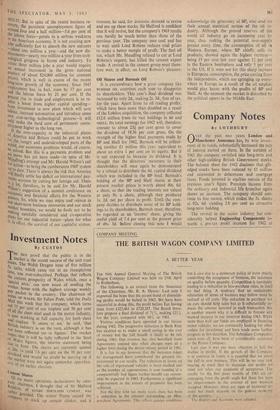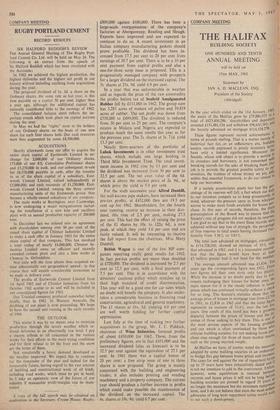Company Notes
y. 1,0THBURY OVER the past two years London and Manchester Assurance. has, by wise invest- ment, of its funds, substantially increased the rate of interest earned on them. In the autumn of 1961 the company switched into Iong-term and other high-yielding British Government stocks. The balance sheet for 1962 diseloses that gilt- edged stocks have been reduced by £ 1 million and reinvested in debentures and mortgage loans. Funds invested in equities remain at the previous year's figure. Premium income from the ordinary and industrial life branches again shows an increase. The company should con- tinue its fine record, which makes the 5s. shares at 92s. 6d. yielding 2.8 per cent an attractive long-term holding.
The revival in the motor industry has con- siderably helped Engineering Components to- wards a pre-tax profit increase for 1962 at £809,000 against £680,000. There has been a large-scale reorganisation of the company's factories at Abergavenny, Reading and Slough. Exports have improved and are expected to continue to do so. A recent investment in an Italian company manufacturing gaskets should prove profitable. The dividend has been in- creased from 17.5 per cent to 20 per cent from earnings of 38.7 per cent. There is to be a 10 per cent payment from capital profits and also a one-for-three scrip issue is proposed. Tills is a progressively managed company with prospects for a larger dividend on the increased capital. The 5s shares at 21s. 9d. yield 4.9 per cent.
In a year that was unfavourable in weather and as regards the price of the raw commodity the profits before tax of Seafield Amalgamated Rubber fell by £111,000 in 1962. The group now has 3,285 acres of mature oil palms and 39,819 acres of rubber. The net profit was down from £558,000 to £499,000. The dividend is reduced from 30 per cent to 25 per cent. The company's estates in Malaya and Nigeria are expected to produce much the same results this year as for the previous year. The 2s. shares at 3s. 74-d. yield 13.3 per cent.
Nearly three-quarters of the portfolio of Lubok Investments is in other investment trust shares, which include one large holding in Third Mile Investment - Trust. The total invest- ment income in 1962 rose by 13 per cent and the dividend was increased from 30 per cent to 32.5 per cent. The net asset value of the 6d. shares is above the market price of 2s. 9d., at which price the yield is 5.9 per cent.
For the sixth successive year Alfred Dunhill, the well-known pipe makers, have increased their pre-tax profits; at £452,000 they are 19.5 per cent up for 1962. Shareholders, for the fourth year running, receive an increase in their divi- dend, this time of 2.5 per cent, making .27.5 per cent. This had the effect of raising the price of the £1 shares by 10s. to 122s. 6d., a new peak, at which they yield 3.6 per cent and are fairly valued. It will be interesting to receive the full report from the chairman, Miss Mary Dunhill.
British Wagon is one of the few HP com- panies reporting really good results for 1962. In fact pre-tax profits are more than doubled at £720,000. The dividend is increased by 2.5 per cent to 12.5 per cent, with a final payment of 7.5 per cent. This is in accordance with the directors' cautious policy which matches up to their high standard of credit discrimination. This year will be a good one for car sales which
no doubt will benefit the company. It also under-
takes a considerable business in financing road construction, agricultural and general machinery.
The £1 shares at 61s. 3d. yielding 4.0 per cent are well worth holding for further capital appreciation.
Last July at the time of making two further acquisitions to the group, Mr. J. C. Pidduck,
chairman of Winn Industries, forecast profits of about £450,000 for 1962. These, from the preliminary figures, are in fact £451,000 and the increased dividend (also as forecast) is to be
32.5 per cent against the equivalent of 27.1 per cent. In 1961 there was a capital bonus of 20 per cent; a free scrip issue of one in three
shares is now proposed. The group is mainly concerned with the building and engineering trades; it also includes printing and vending machinery and a property company. The current year should produce a further increase in profits which could make possible the maintenance of the dividend on the increased capital. The 4s. shares at 19s. 9-d. yield 6.7 per cent.







































 Previous page
Previous page